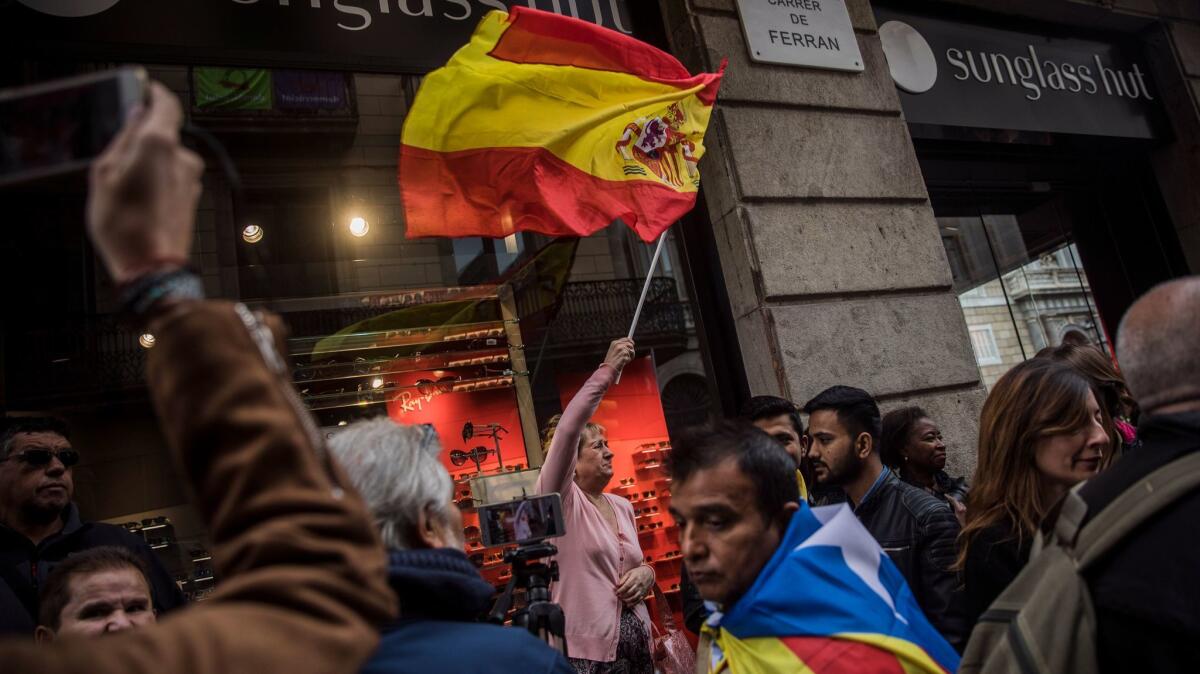Spain’s Catalonia region is set to pick a new parliament Thursday amid ongoing independence fight

- Share via
Spain’s Catalonia region — best known for ravishing beaches and its tourist-magnet capital, Barcelona — grabbed the spotlight in October by holding an independence referendum despite central government warnings against any moves toward breaking away. The vote, which favored secession, was followed by a unilateral declaration by the regional parliament that Catalonia was cleaving itself off from Spain.
That hasn’t happened: Spain’s central government swiftly stepped in, stripping the northeastern region of its powers of autonomy and ordering early regional elections to determine new local leadership. With that vote set Thursday, where do things stand for Catalonia’s independence fight — a confrontation that’s being closely watched by the rest of Europe?
What set off the secession bid?
The prosperous region, which accounts for about a fifth of Spain’s economy, has long felt that it is made to subsidize its poorer neighbors. Spain’s drawn-out financial crisis, beginning in 2008, exacerbated that sentiment, with many of Catalonia’s young people — like their counterparts across Spain — disillusioned by the difficulty of finding a good job or being able to buy a home.
But independence yearnings go deeper than economic malaise: Many Catalans harbor rancorous memories of the 40-year rule of dictator Francisco Franco, when their language was banned and their proudly held culture denigrated. Franco died in 1975 and Spain’s democratic post-Franco constitution gave Catalonia many of the trappings of autonomy, but a large number of people still feel stifled by Madrid’s rule.
What’s happened since the independence referendum Oct. 1?
Spanish Prime Minister Mariano Rajoy dissolved the regional government on Oct. 27, just after the Catalan parliament proclaimed independence. Catalonia’s deposed president, Carles Puigdemont, then fled into self-imposed exile in Belgium, and has waged a virtual campaign using teleconferencing and social media. The region’s former vice president, Oriol Junqueras, remains jailed in Spain, along with several other leading independista politicians. Spanish authorities are reluctant to give the secessionist leaders free rein, but also fear making martyrs of them. Junqueras has declared from behind bars: “We have to persist.”
Enoch Alberti Rovira, a law professor at the University of Barcelona, said in an interview, “This election is very different from any we’ve seen before because of the special circumstances.”
There’s been economic fallout as well as political: More than 2,500 companies have moved their headquarters out of Catalonia, and tourism has fallen off by about 5% since the referendum, although the region remains a strong draw for visitors.
How is the vote Thursday different from the October referendum?
This vote isn’t an independence referendum, but views regarding secession have overwhelmingly colored the contest. Traditional campaign issues like the economy have largely gone by the wayside, with two main groupings slugging it out: pro-independence factions and “constitutionalists” who support a unified Spain.
To elect the 135-member parliament, whose members normally serve four-year terms, voters cast ballots by party, and the parties then allocate the individual seats. The threshold for a party entering parliament is 3% of the vote. The main parties in contention are the pro-independence coalition Junts pel Si, or Together for Yes, which allied with the small far-left Candidatura d’Unitat Popular, or CUP. Those opposing independence include the Ciutadans, the second-largest party in the previous parliament. Once parliament is formed, it elects the regional president.
Who’s looking stronger heading into the vote?
Campaigning ended Tuesday with public opinion polls suggesting a contest too close to call. But a high turnout is expected, perhaps more than 80%. Fewer than half the electorate turned out for the Oct. 1 independence referendum, which the government said was illegal, and which the pro-secession side overwhelmingly won. So this vote is seen as far likelier to reflect the overall view of Catalonia’s 7.5 million people.
How has Europe responded to Spain’s secession crisis?
Nationalist-populist movements have erupted like brush fires across the continent, and European leaders have shown little sympathy to Catalan secessionists, who set off Spain’s biggest constitutional crisis of its modern era. With European Union institutions rocked by Britain’s 2016 vote to leave the bloc, few in Brussels want to see any more fissures — although the secessionists are largely enamored of the EU and aspire to remain part of it. If the independence side prevails, Brussels has warned an independent Catalonia would be years away from achieving EU membership.
Will the Thursday vote settle things in Catalonia?
Doubtful. If the secessionist camp is defeated, there have been suggestions that the main pro-independence party, the CUP, could seek to form a so-called government in exile, with Puigdemont as its head. If the secessionists win, they will have internal splits to contend with as they try to run the region. Pro-independence parties held only a slender majority in the previous parliament. It’s not clear they, and a small leftist party that backed them, would be able to forge a united front even if they garner the largest share of votes.
Spain’s central government has said its stripping of Catalonia’s autonomous powers would be reversed once a lawful government was in place. But any fresh secessionist moves, which Spain says would be illegal, could result in a longer-term suspension of regional authority over the Catalan police force and public services like education and healthcare. And growing economic instability could be on the horizon for Catalonia and Spain as a whole — which is a worry to all of Europe.
Special correspondent Meg Bernhard in Barcelona contributed to this report.
More to Read
Sign up for Essential California
The most important California stories and recommendations in your inbox every morning.
You may occasionally receive promotional content from the Los Angeles Times.













